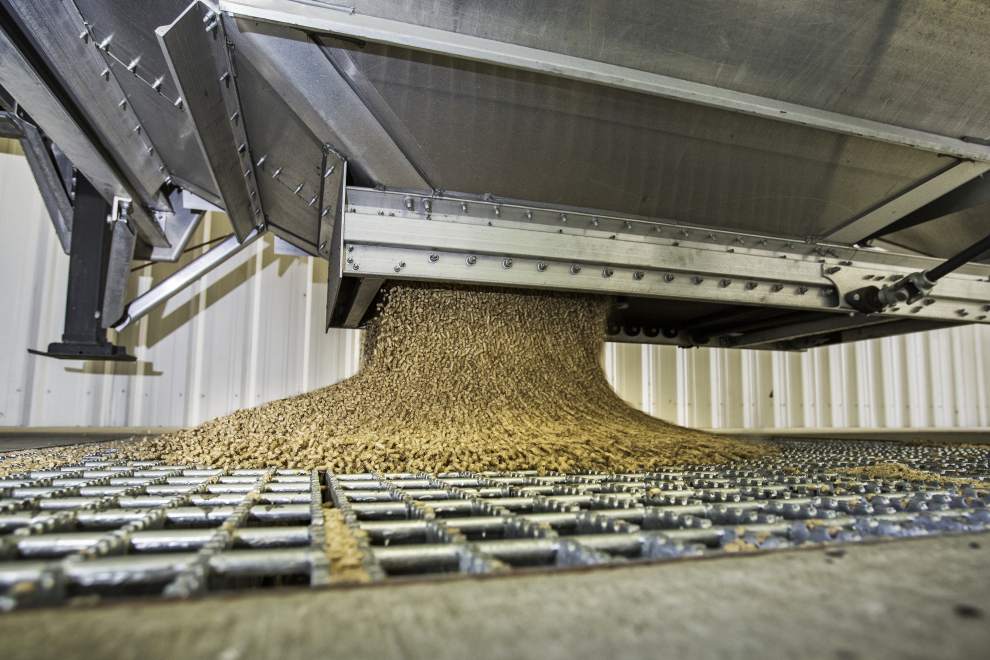WASHINGTON - Massive U.S. exports of industrial wood pellets to meet green energy goals in Europe is not a threat to the sustainability of U.S. Southern forests, says a new report from the pellet manufacturers.
Drawing from U.S. government and available market data, the report was commissioned by the U.S. Endowment for Forestry and Communities, National Alliance of Forest Owners (NAFO) and the U.S. Industrial Pellet Association (USIPA) - three organzations representing the producers of wood pellets and their suppliers.
Concerns wood pellet exports threaten forests or the viability of other forest products manufacturers are unfounded
The report reveals that industrial pellet exports represent a very small part of forest harvests in the U.S. South, the groups say. Panel
ARTICLE Wood Pellets Production Growing Dramatically The production of wood pellets has seen a spike in recent years, thanks to their high energy density and ease of production/supply, and a backdrop of tighter emission control norms. | 
|
manufacturers have expressed concern that drawing too much wood pulp for fuel will raise prices on raw material forOSB and plywood.
- Total removal of wood in the U.S. South for all markets is 3.3% of the total forest inventory.
- Pellet exports represent 0.08% of the total inventory.
- In 2014, pine removals for industrial pellet production totaled 3.7 million tons or 0.3% of the pine pulpwood inventory and 0.09% of the total pine inventory.
- In 2014, hardwood removals for industrial pellet production totaled approximately 2.4 million tons or 0.2% of the hardwood pulpwood and 0.06% of the total hardwood inventory.
- In 2014, pellet exports from the U.S. South to Europe, which represent the vast majority of U.S. pellet exports, were 3.6 million metric tons, or 40% of Europe’s 9 million metric ton industrial pellet consumption.
- Future industrial demand for U.S. pellets overseas represents 0.3% of total forest inventory in the U.S. South.
Realistic demand and market share outlooks show that U.S. industrial exports of biomass pellets to Europe could eventually rise to 10.8 million metric tons.
Annual removals to meet this demand would total 25 million tons, which represents 1.0% of pulpwood inventory and 0.3% of total forest inventory in the South.
The export of industrial wood pellets to Europe has become a sizeable business, as power companies there replace some coal with wood pellets for their fuel mix. Pellets are regarded as carbon neutral, since growing trees extract carbon from the atmosphere in almost one-to-one ratio with the weight of wood pellet fuel.
“Markets are vital to keeping working forests as forests," said Carlton Owen, CEO of the U.S. Endowment for Forestry and Communities. Owen cites jobs as an additional appeal to pellet manufacturing.
"Whether those jobs are from traditional lumber and paper products or from renewable energy options such as those provided by wood pellets, each is vitally important to America’s heavily challenged rural communities.”
“This report puts to rest concerns that wood pellet export markets pose threats to the sustainability of U.S. Southern forests or the viability of other forest products manufacturers,”
“The volume of growing trees in our forests has increased by 50% since the early 1950s. The strong, positive relationship between markets and tree growth is why our forests remove 13% of our nation’s carbon emissions from the air each year,” said Dave Tenny, NAFO President and CEO. “This report should put any concerns about the fate of our Southern forests to rest and allow landowners to continue doing what they do best – stewarding our forests to provide forest products and renewable energy while contributing to cleaner air and water and more abundant wildlife habitat.”
Download the report, Wood Supply Market Trends in the US South: 1995 – 2015, or get it at nafoalliance.org/images/issues/pellets/Forest2Market_USSouthWoodSupplyTrends.pdf.
The U.S. Endowment for Forestry and Communities (the Endowment) is a not-for-profit public charity working collaboratively with partners in the public and private sectors to advance systemic, transformative, and sustainable change for the health and vitality of the nation’s working forests and forest-reliant communities – www.usendowment.org
The National Alliance of Forest Owners (NAFO) is an organization of private forest owners committed to advancing national policies that promote the economic and environmental benefits of privately-owned forests. NAFO membership encompasses more than 80 million acres of private forestland in 47 states. Working forests in the U.S. support 2.4 million jobs. www.nafoalliance.org
The U.S. Industrial Pellet Association is a not for profit trade organization that promotes safety and sustainability practices within the US industrial-grade pellet industry, as well as the growth of the overall bioenergy market. USIPA was founded in February 2011 by several industry leaders, including Enviva, Fram Renewable Fuels, Georgia Biomass, and the Westervelt Company. Today, USIPA represents over 60 members throughout the supply chain. www.theusipa.org
Source: U.S. Endowment for Forestry and Communities; National Alliance of Forest Owners; U.S. Industrial Pellet Association







Have something to say? Share your thoughts with us in the comments below.